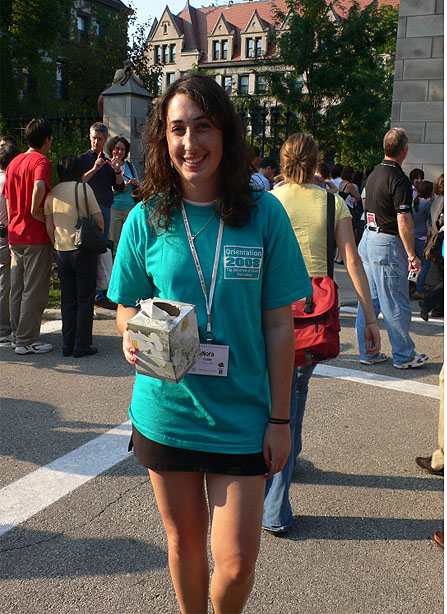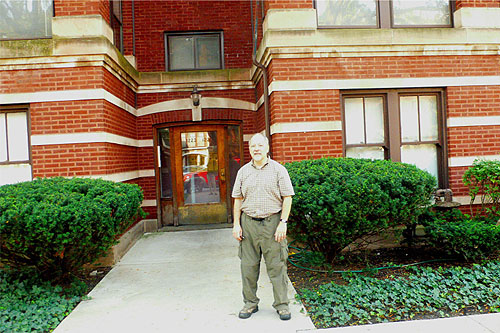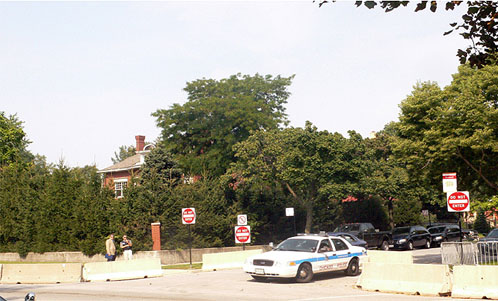
The Next Phase
By Frank Gruber
I'm writing this Sunday evening on a flight back to L.A. from Chicago,
where I was with my wife participating in the ritual of depositing our
son at college (the University of Chicago, in this case).
Colleges have this separation thing worked out. After a convocation
during which the president of the university and the dean of the undergraduate
college welcomed the students and expressed appropriate sentiments to
us parents (mostly of a congratulatory nature), we all marched behind
a band of bagpipers to the center of the campus.
There, signs pointed in two directions -- one directed students straight
ahead to have their class picture taken, one directed parents to the
right to a reception. My wife remembered something that I learned as
a soccer coach when Henry was about ten. According to the AYSO advisory,
children at that age do experience disappointment when their team loses,
"but nothing that a slice of pizza couldn't make better."
Apparently snacks and an open bar have the same effect on parents of
18-year-olds; I didn't see any weeping, although the university helpfully
had upper-classmen volunteers circulating in the crowd with boxes of
tissues. (Readers may recognize one of these volunteers from this photo
-- Nora Casey, who graduated in 2007 from Samohi, is a second year student
at Chicago who returned early to volunteer during Orientation Week.)
 |
| Nora Casey, Samohi '07, Chicago '11 (photo by Frank Gruber) |
Since Henry is our only child, this weekend also marked the transition
of my wife and me to "empty-nester" status. "Welcome,"
I thought to myself, "to the rest of your life."
When I contemplated writing this column on the flight back, I expected
I would be just bubbling with bathetic insights, mournful yet hopeful
ideas about the past and the future. You're saved from that. The weekend
was too full of thinking what supplies Henry would need for his dorm
room and which of those I should let him get on his own, that I didn't
have time to plan out my next (what I hope will be at least) 30 years.
My planning for my future was also disrupted by a large amount of nostalgia.
Both my wife and I graduated from the University of Chicago in the early
'70s, and it was hard to think about the future as we wandered around
the university's campus and its neighborhood of Hyde Park recalling
the past.
How could I think about my post-middle-aged future when what I really
wanted
 |
| The author in front of his old apartment building (photo by
Janet Levin) |
to do was be a college student again? And that reminds me -- how do
I tell Henry how to get more out of his college years than I did without
telling him how to get more out of his college years than I did?
Then there was another distraction: it was hard to think about my personal
future when I was also thinking about the future in a specific way that
was not personal but which could have a large impact on my future. Hyde
Park is now famous for being Barack Obama's neighborhood and it was
hard to forget it.
On Saturday I bought towels for Henry in a Walgreen's drugstore that
was definitely competing to be designated "Barack Obama's Walgreen's"
-- it seemed like half the store was Obama merchandise. Saturday night
my wife and I ate our first empty-nester dinner at a pizzeria where
the staff wear T-shirts that have "Obama eats here" printed
on the back (we bought three as souvenirs).
On Sunday my wife and I took a long walk -- first down to the shore
of Lake Michigan and then in a big arc that took us through Hyde Park
into Kenwood, the adjacent neighborhood to north where the Obamas now
live. Yes, we were looking for their house; yes, just like any old tacky
tourists in Beverly Hills looking for stars' homes. We found it; in
case you wonder, it's the house guarded by the Secret Service. And although
you're only allowed to get close enough to see it through some trees,
I am unembarrassed to say that I had goose bumps.
 |
| The Obama's house (behind the trees), (photo by Frank Gruber) |
So as for this future thing, this next phase of my life -- I'll just
have to see how it plays out.
* * *
I do want to say something about the week's financial events, culminating
in the plan that Fed Chairman Ben Bernanke and Secretary of the Treasury
Henry Paulson have put forward for the government to buy $700 billion
(or so) in distressed mortgage-based securities.
There are a few things that gall me about this. One is political. Just
hearing John McCain trying to sound like a Populist railing against
Wall Street greed drives me crazy, but I will mention that a few weeks
ago I pointed out that the Republican Party was becoming a facsimile
of the Democratic Party of William Jennings Bryan, so maybe this is
to be expected.
Another thing that galls me is just plain grievance, and populist grievance
at that. I hope the Democratic Congress won't approve any plan that
doesn't strike a hard bargain against the people and the companies that
have profited so handsomely during the recent Gilded Age. I'm waiting
for shareholder derivative lawsuits against the "brilliant"
executives who kept telling the breathless media how they deserved their
hundreds of millions, but in the meantime the key is for the government
to pay the absolute minimum for these assets.
This is a point that Democrats in Congress and Sen. Obama have to make.
Sure they want to be responsible and protect the financial system from
cratering, but they can't let the Republicans and John McCain get away
with all this "greed" talk when it's their backers on Wall
Street who have profited so greatly from the Republicans' eight years
of facilitating greed.
I like the idea of the "reverse auctions" that have been
proposed, by which the banks would compete for the government's rescuing
dollars by lowering the prices of their bad assets.
There's an urbanism component in this, too. Once the government buys
these mortgages, the government will have financial stakes in the neighborhoods
where those mortgages reside. For the government to get the taxpayers'
money back, and even make profits, those neighborhoods need to thrive.
For them to thrive, the working class people who live in them need to
thrive, and we will need coherent and efficient -- "smart"
-- land use policies to make real estate in these neighborhoods valuable
again.
The less money the government pays for these assets, the more money
it will have for programs that will increase the value of those assets
-- and the values of those neighborhoods.
Of course, it all depends on who will be in charge of spending the
money and creating the policies. One thing that hit me while I was in
Hyde Park over the weekend was that it was a real neighborhood in a
real city, full of beautiful homes and substantial brick apartment buildings.
I'm looking forward -- with hope -- to having a president who will go
home from the White House for the holidays to a neighborhood like that.
|